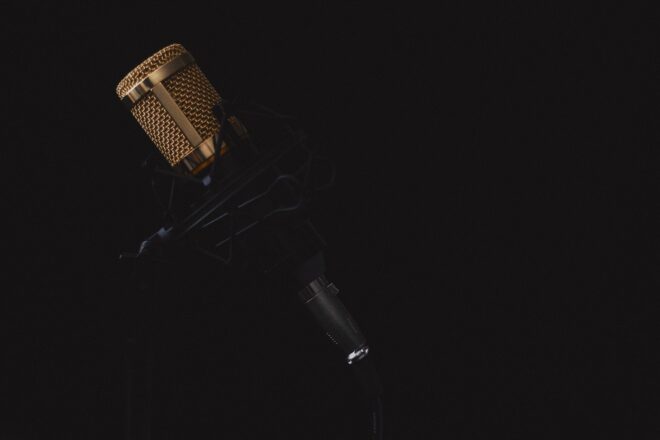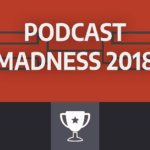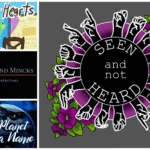Why the Podcasting Community Sucks

Last September, my stepdad passed away after months of trying to recover from a sudden stroke last summer. Like so many people do after a tragedy, it’s made me reevaluate my life and what I focus my energy on. As I’ve taken a long, hard look at the discourse that permeates the podcast industry—particularly the fiction side, where I have the most experience—I came to a startling conclusion:
Most of it is completely pointless.
Obviously, yes, some callouts in the podcasting community are important and necessary. Calling out a show’s racism or discussing transphobic trends in casting calls are both important because they affect people’s real, actual lives. But the vast majority of podcast discourse I’ve seen is just people taking something very minor and treating it like it is the literal end of the goddamn world. In the sphere of Twitter podcasting discourse, somebody tweeting that they dislike a fiction trope spurs more arguments and attacks than someone tweeting that they think all trans people should die.
Good People are only ever Right; they never make mistakes, never have bad days, never say anything Wrong.
There is no room for minor arguments; no space given for small differences in opinion. Two people cannot have a personal disagreement without one or both of them posting about it publicly and forcing the entire community to pick a side. Everything is a battle and everybody is determined to Win, because Losing means ostracization from the community—this community which drains you so much, which leaves you so stressed out and anxious all the time, but which you’re dependent on because you need to stay in people’s good graces for them to support your art.
If your mutual tweets something about disability rights that you disagree with, you can’t politely say “I disagree with you and here’s why.” You absolutely can’t just leave it be and chalk it up to a difference of opinion. In the black-and-white world of Twitter discourse, there is no middle ground: there is only Right and Wrong, and you cannot allow yourself to be Wrong because being Wrong means you are a terrible person. Good People are only ever Right; they never make mistakes, never have bad days, never say anything Wrong.
Your mind (and your body, for that matter; our bodies have terribly wonderful memories) remembers every time that you have watched the people on your timeline viciously destroy anybody who did something Wrong. Maybe you even participated. It was justified, of course—they were Wrong and you were Right, and you were simply expelling Bad People from the community so that Good People could remain safe. But now, all of those incidents have hardwired your brain to be terrified of being Wrong: if you’re Wrong, the timeline will turn on you in an instant. You cannot allow yourself to be Wrong. To be Wrong is to be Bad and to be Bad is to be Worthless.
So when someone says something you disagree with, you cannot leave it be, nor can you approach them as if they are a kind person who simply made a mistake. No, that’s not enough. They were Wrong, remember? And Wrong people are dangerous. They can’t be a Good Person if they were Wrong. There is no such thing as a mistake. There is no such thing as two people having equally valid opinions. Only one person—the Good Person—can be Right. And this person said something Wrong, so they are Bad. And since they are Bad, you can’t approach them in good faith and have a polite discussion with them to see their side of things. They must be intentionally malicious, they must be Bad, so you are under a moral obligation to attack them as hard as you can.
Read more: 20 of the Weirdest and Worst Things I’ve Seen on Casting Calls
Halo and Horns run rampant in the community.
Two people have a disagreement. This is how it starts. This is how it could end. But it won’t end like that—it can’t. Disagreements in podcast Twitter cannot be resolved privately; they must be resolved in public, so that everybody can join in. What is a more efficient way to separate the Good from the Bad? How better to exile the Worthless than to force them to state their opinion on every single possible issue until you finally find one they’re Wrong about?
If you think that you can avoid this by just never stating your opinion, you are so very, very wrong. Not stating an opinion is, in and of itself, Bad. See, it’s not just enough to not have a Bad Opinion—to be a Good Person, you have to have a Good Opinion that you state publicly, as often as possible, at every single opportunity. If you do not publicly state the Good Opinion, it will be assumed that your opinion is Bad. You are guilty until proven innocent. What, you want to stay out of discourse? You don’t think you know enough about the situation to have an opinion? That just means that you’re a selfish coward who’s refusing to use their platform for good. You monster.
It’s not just curiosity—it’s fear.
Complicating this even further is how many people will subtweet about drama rather than just stating their opinion plainly. “Subtweeting” is the act of making a tweet where you do not explicitly say what (or who) the subject of the tweet is, but the context makes it clear for anybody who’s tuned into current discourse.
So, instead of tweeting:
“I disagree with Amy’s stance on podcast conventions—I think that cons should pay their speakers whenever possible.”
You tweet:
“Wow, I cannot believe that there are still popular podcasters who genuinely think it’s okay for conventions to not pay their speakers. I guess you all just hate poor people and think that only rich people deserve to speak at conventions lol”
It’s not enough to share your Good Opinion—you have to make sure it’s worded to cast the other side in the worst light possible, so that nobody can say so much as “I think they actually make some good points” without seeming evil. Now this isn’t just an issue of whether or not conventions are obligated to pay their speakers, it’s an issue of morality and social justice: if someone doesn’t agree with you, that doesn’t just mean they have a different opinion, it means that they hate poor people.
And Twitter isn’t helping.
This serves the purpose of drawing people deeper into podcast discourse. If you log onto Twitter and see half of your timeline subtweeting about what appears to be the same topic, natural human curiosity will compel you to dig deeper. But it’s not just that, is it? It’s not just curiosity—it’s fear. If you don’t know who they’re talking about, they could be talking about someone you like; and if they’re talking about someone you like, you have to stop liking that person ASAP so that nobody will think you’re associated with them. They’re Wrong now. They’re Bad. And only Bad People can tolerate the presence of other Bad People. If you don’t figure out who everyone is tweeting about and you later make an innocuous tweet mentioning that you like that person, the subtweets will turn to you instead:
“lmao I cannot believe there are people who actually still support Amy after everything she said. unfollowed.”
People who subtweet insist that they do it for their own safety—that if they outright said who their tweets were about, they would be attacked by that person’s supporters; so, you see, subtweeting is the only way to voice their stance on the issue without getting attacked.
But it doesn’t actually work like that.
Here’s the thing: your Twitter account is not a diary. It is not private. Even locked Twitters, often referred to as “private accounts”, are not actually completely private if they have any followers. Twitter is, inherently, a public medium. When you tweet something, it’s because you want other people to read it. You cannot argue with that; that is the very nature of social media. If you wanted it to stay private, you would have written it down in a journal. But you posted it on Twitter, which means that you wanted people to see it; and if you wanted it to be seen, then you wanted it to be understood; and if you wanted it to be understood, then you had to include enough information that people familiar with the drama can tell what it’s about. And if they can figure it out… so can the people you fear would attack you.
Subtweeting does not keep you safe. It just doesn’t. That’s an argument that falls apart the second you examine it further. But it does a great job of further dividing the community into an “in” group and an “out” group: if you know, you know. And if you don’t know, that’s your fault for not being online 24/7. How dare you not have in-depth knowledge of every single argument and wrongdoing in the podcast community? How dare you have a personal life (or a job or a family or health issues or a breakup or—) that prevented you from sharing your opinion on Twitter discourse within 15 minutes of the first tweet going up?
And the podcast community pulls you back in.
And this is how the podcast community becomes a self-sustaining mess, an endlessly renewable resource of drama and tears: it is not enough for us to be trapped in the suffocating grip of podcast discourse. We have to make sure everybody else is stuck here with us.
The full scope of how bad this is didn’t hit me until a few weeks ago. I was taking a shower and thinking about something I was contemplating posting on Twitter. As is my habit now, that quickly turned into me thinking about every possible bad faith interpretation someone could have of it, every angle that someone could use to attack me. I started playing with the wording of the tweet to make it more clear. Finally, I got it as clear as it could possibly be, but I knew that people could still find a way to attack me for it. I started planning out my potential responses to those, what I would say to defend myself. This is a habit I developed ages ago that I haven’t really thought much about. But as I was standing under the hot water and thinking this all over, it began to feel familiar somehow. I thought about that, tried to figure out why. And then the pieces clicked into place.
This is what I’ve done in every toxic and abusive relationships I’ve had. This is it exactly. In those relationships, I knew that anything I could say could be used as ammunition to gun me down. To protect myself, I would plan out the exact wording for every single thing I wanted to say—no matter how innocuous—and prepare myself for the ways it could be turned against me. That is a survival skill I picked up to survive toxicity and abuse. And now it’s a survival skill that I learned again to survive Twitter.
it is not enough for us to be trapped in the suffocating grip of podcast discourse. We have to make sure everybody else is stuck here with us.
Twitter is not a healthy environment. Most people know that, but many podcasters seem to hold the opinion that the podcast community is different. But I assure you, it’s not. It is just as bad as everywhere else. Good Liberal Podcasters who have the Right Opinions and say the Right Things will tear you down as viciously as any incel Redditor, but while they do it, they’ll smile at you ever so sweetly and tell you it’s all your fault for being Bad, for not being as Liberal as them, for not having the Right Opinions. If you think that homophobic fundamentalists can be vicious, just wait until you tell a queer podcaster on Twitter that you think bisexuals can call themselves femme. Podcasters will tear you apart, make you feel Worthless, convince everyone around you to abandon you, and then they’ll go and cry about how traumatic it was for them, how you triggered them, how they just don’t feel safe around you anymore.
This is not healthy. This is not good. No matter what podcasters think, this is not Right.
So how will the community respond to this?
What’s really infuriating to me about writing this piece is that I already know all of the possible ways the response to it could shake out.
Option 1:
People ignore it. This isn’t terribly unlikely—something I’ve noticed as a Discover Pods writer is that our pieces rarely get large amounts of attention unless people want to yell at us for doing something Wrong. (Editor’s note: This is writer Cassie Josephs’s feelings and not an official Discover Pods standpoint, and we have not done research into this phenomenon. This is a vibe only. As someone who was dragged back onto Twitter to defend a writer, though, it certainly feels accurate.)
Option 2:
People are angry. This also seems fairly likely. In this option, the exact people this article is about will see this article and, on some level, recognize their own behavior. But instead of thinking “Hey, yeah, that isn’t great for me to do”, instead of reflecting and growing and maybe even changing, they’ll say that this article is problematic. That I hate marginalized podcasters, that I’m villainizing safety tools (“Subtweeting keeps us safe!”), that I’m saying nobody should speak up about mistreatment and that nobody should believe abuse victims. They’ll rip every single line apart to find things I said that they think are Wrong. It won’t matter that none of that is true. It won’t matter that reading the entire article would prove that’s not what I’m saying at all. People will be angry because the only other option is acknowledging they’re Wrong, and they’re still convinced that being Wrong makes you Worthless. They cannot accept a world in which they are not Right.
Option 3:
People are lacking all self-awareness. The exact type of person this article is about will read the article and think “Wow, that’s awful! I’m so glad I don’t do that!”, ignoring all of the subtweets they’ve made, all the drama they’ve retweeted, all of the people they’ve viciously attacked for being Wrong. They’ll retweet the article and say “This is so true!” and then right after it they’ll retweet a callout that amounts to nothing more than “this person should be completely and totally ostracized from the community because they said something that made me feel a little sad”.
When I first became aware of these issues, I might have viewed this article differently. I might have thought “Well, maybe if people read this article, they’ll change!”. I don’t believe that anymore. I believe the issues in the podcast community ultimately run deeper than podcasting itself. The issue stems from years of social media wearing away at our ability to feel compassion for other people, our ability to see nuance, our ability to accept being Wrong. As surely as rocks being ground into sand, the echo chamber that is social media has created an environment that grinds away kindness and compassion until all that’s left is anger and cruelty. This issue did not originate in the podcast community. But, despite what some podcasters say, it is sure as hell present in it.
Read more: Black History Month: Integrated Diversity in Podcasting
So why did I write this article about the podcasting community? Why bother at all?
Honestly, part of it is probably catharsis. Not just for me, but for my friends. When I first started sharing fragments of this article with my podcasting friends, they told me how much they saw their own experiences in this article. I am writing about what we all go through. Maybe that will help us feel better. I don’t know.
But I think there’s something else, too. I don’t hope that this article will change anything, but I do hope that some of the people who need to hear this message will see it. That maybe—just maybe—this article will make them realize how toxic their environment is, that they don’t need to put up with it, and that they can escape if they want to.
Does it help you grow as a person? Does it make you happy? Does it make the world a better place?
To those people, I want to say this:
In July 2021, my stepdad had a stroke. It came out of nowhere—he didn’t drink, didn’t do hard drugs, ate well, exercised regularly. He did everything “right” and he still had a stroke. And then, in September, complications from that stroke took his life. He was only 44 years old. I thought that he was going to be in my life for 40+ years. Instead, he was in it for seven.
And now, with a new appreciation for how horrifically short life can be, I cannot find any way to convince myself that the discourse in the podcast community is worth it. I cannot see how there is any purpose to the way that people will be publicly torn apart over nothing—over discourse that does not actually matter.
Actual queer people are not physically hurt by a straight actor playing a gay character. A cishet creator writing queer characters will not set the queer rights movement back three decades. Someone criticizing your event or awards show or network will not kill you. A creator running their show on volunteer labor is not going to topple the economy. Creators putting ads in their show does not ruin your experience of listening to podcasts forever. A critic writing a negative review of your show does not mean that you can never make podcasts again. None of this matters. All of this is just people tearing each other apart for stupid, petty, pointless reasons. It’s just a bunch of hurt people dedicating hours of their week—even hours of their day—to hurting each other more.
And what do you actually gain from it? Does it help you grow as a person? Does it make you happy? Does it make the world a better place?
Or does it just make you upset? Does getting into Twitter arguments actually make your life—or anyone’s life—better in any way, or does it just make your mental health worse by triggering anxiety, depression, hopelessness, and anger over things that you can’t actually ever change?
One night, my stepdad was alive and well, with no idea of what was about to come. He went to work, said hi to his friends, kissed my mom and told her he loved her. He thought he’d get to tell her a million more times. By the next morning, he was comatose in a hospital. A few weeks later, he was dead. I could die tomorrow. You could, too. You could die tonight. In an hour. In a minute.
I want you to ask yourself this: if you knew that today was your last day alive, how much of it would you spend arguing about podcasts online? Keeping that answer in mind, please realize that today could very well be your last. And if it is, you could spend that day drawing, singing, hanging out with your friends, reading a good book, walking through your favorite park, spending time with your family… or you could spend it arguing with people online about things that don’t even matter.
I’ve made my choice. What’s yours?













Comments
Comments are closed.